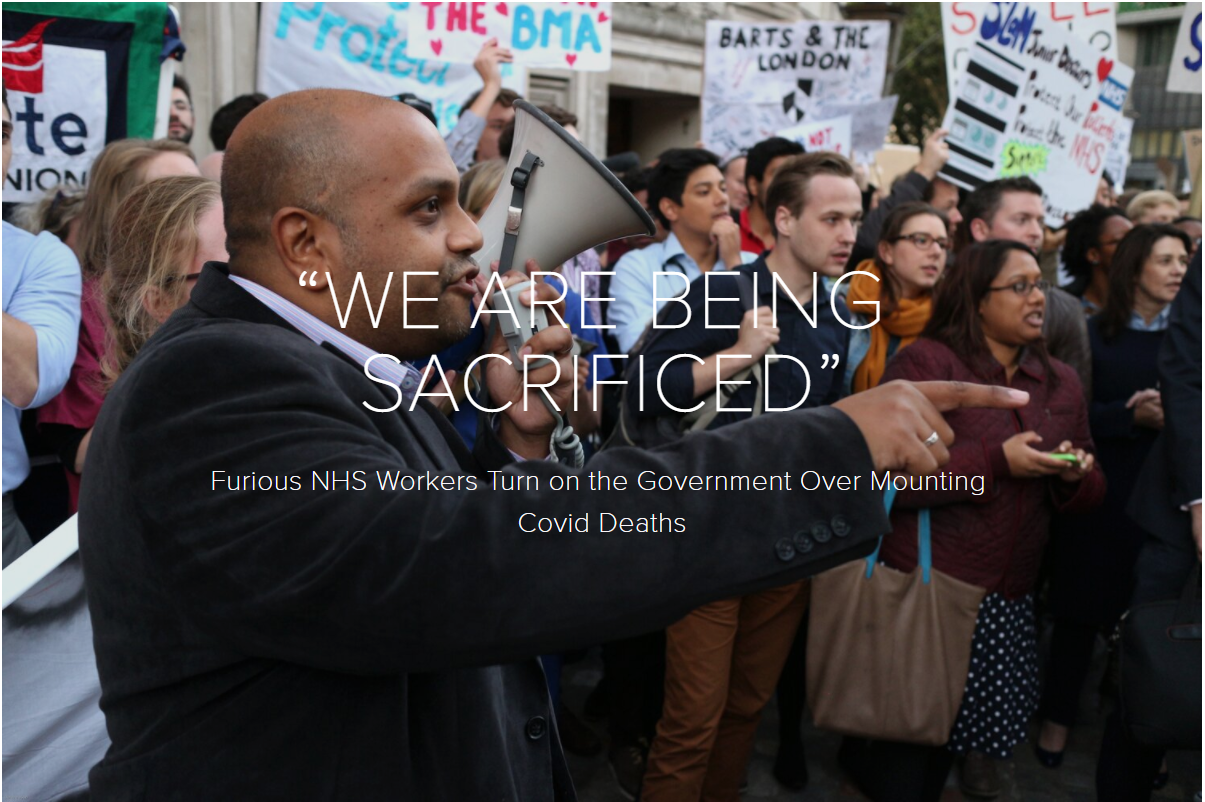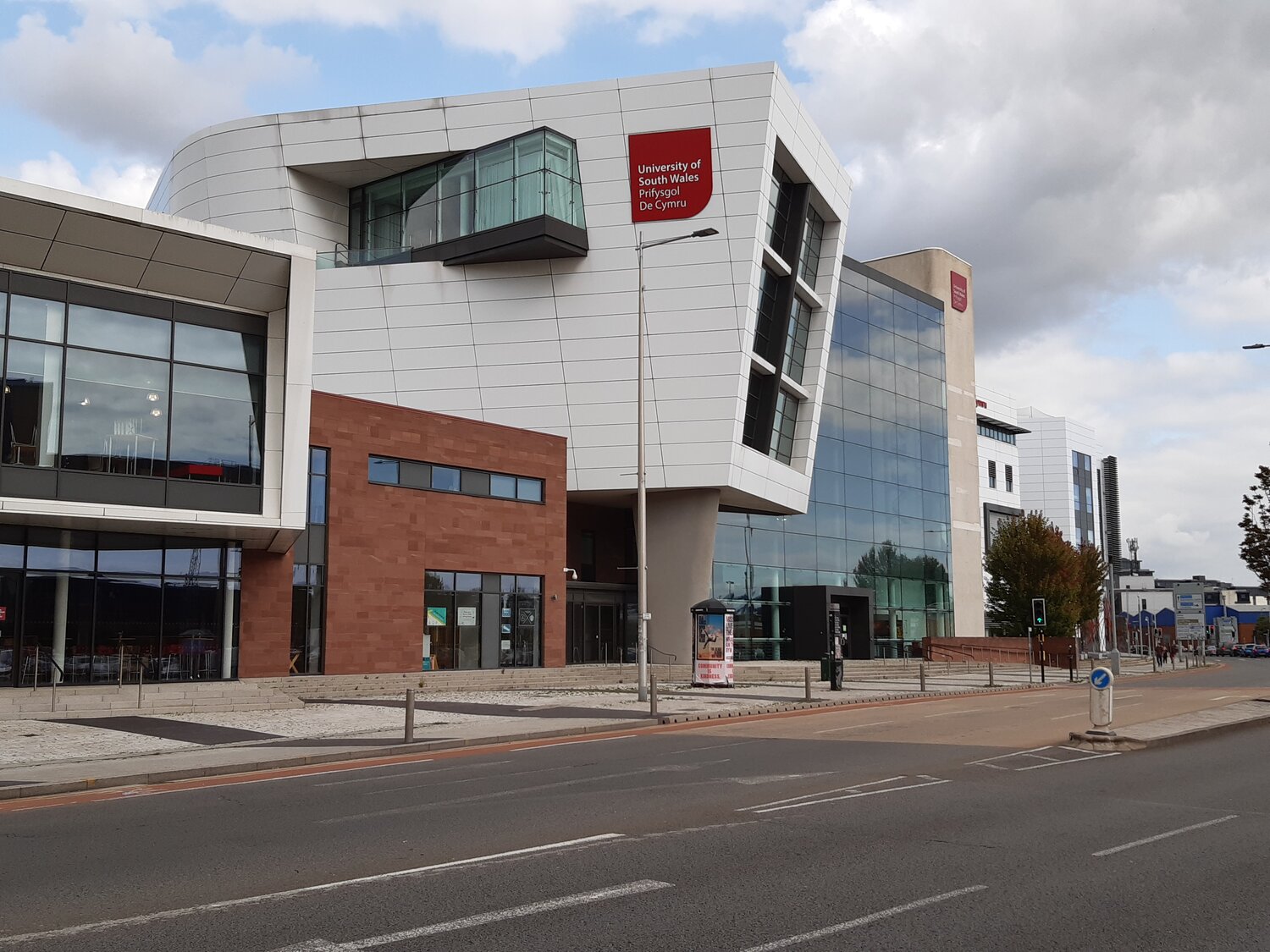
“we Are Being Sacrificed” – Furious NHS Workers Turn on the Government Over Covid Deaths
After another week which has brought yet more deaths and hospitalisation of health workers, those on the Coronavirus Front-line are increasingly turning against both the Welsh and British governments. The death of their colleagues, a chronic lack of PPE, failure to test and low pay is fuelling a new mood of anger among NHS workers and heightening calls for action.
Cover Image: Steve Eason (Junior Doctor Strike 2016)
“They’re just treating us like crap, basically,” says Julie*, a nurse with Cardiff and the Vale University Health Board. “There’s total disregard for the way we feel.”
“The main thing is the swabbing. I’m off and I’m waiting for a swab [Covid test]. It’s the third day.. I’m still waiting for a phone call. There’s another colleague who’s waited 8 days!”
“We’re just being treated as if we’re disposable,” she says.
An experienced nurse and still waiting for a Covid-19 test, Julie (not her real name) is very nervous about speaking to me and won’t even let me take her number. Instead she got mine from a colleague and withholds her caller ID when she rings me. At the same time, she feels she has no choice but to speak out.
In many ways this dilemma reflects a wider battle going on in the minds of many NHS workers. On the one hand fear, on the other a growing rage at being thrown into fight Coronavirus with no testing, inadequate PPE and low pay.
But seeing three health workers in Wales die from Covid-19 over a seven day period has shifted people’s mood towards the latter. “It’s definitely changed more to anger,” Julie explains. “I mean before it was like fear of the unknown but ‘c’mon, we can do this.’ But now it’s definitely changed.”
This anger is directed at hospital bosses but also the governments in Westminster and Cardiff Bay.
“I don’t know his name,” Julie says, referring to Welsh First Minister Mark Drakeford, “[but] I’ve seen him get questioned over staff testing. It’s mid April and we were supposed to have like 5000 swabs a day and it’s not happening. Like, what the hell is going on?”
As well as a chronic lack of testing, Julie says the advice around PPE “changes every few days” and describes a culture where staff are told they are being “over cautious” when demanding proper protective equipment even when dealing with Covid patients. “There’s definitely a shortage with gowns,” she says.
Her experience, specifically around a lack of full gowns, flies in the face of what Welsh Government told the BBC on Friday night – that they were “keen to reassure everyone it has PPE stock.”
I ask Julie what she would say to the Welsh Health Minister, Vaughan Gething, who when faced with a union statement which said that workers were fearful of going into work without PPE, said: “So far we have distributed more than 8 million extra pieces of PPE from our pandemic stocks, over and above the usual supplies.”
“Well where the hell is it?” she responds angrily. “ I’ve worked shifts where we’ve got surgical masks…we’ve got 2 boxes left and you’re thinking ‘shit what the hell are the night staff gonna do, where are they gonna get their masks from, is this gonna last the whole shift?’”
Julie felt so desperate about the situation that she started contacting manufacturers herself “to see if there’s any way my ward can be given visors.”
“I think they’re incompetent…,” Julie says of the government. “They’ve had what, since December to plan for this and they’ve seen this moving across Europe. They’ve seen what’s happening in Italy.”
Julie’s experience and sense of the mood among her colleagues is backed up by Becky, a healthcare assistant at Heath Hospital, Cardiff.
“It’s that divide,” she says. “You got some who are really distressed and that’s fuelling their anger, and then others are just crying at work you know.”
She says things took a real shift last weekend when the news came of the death of a well loved colleague, Gareth Roberts. A nurse of over 40 years, he had been working around Covid patients. On the day that staff learned of his death, Conservative Health Secretary Matt Hancock told BBC radio that some health workers were ‘overusing’ PPE.
“Lately people have been mentioning Matt Hancock and how annoyed they are,” Becky tells me.
“People are starting to click now. Right at the beginning people were you know ‘poor Boris, he’s doing his best’ but now, the comments from Matt Hancock about people wasting PPE has infuriated people. It came out the same time as Gareth dying you know.”
“I just think he’s an idiot…”, Julie says of Hancock. “I would love to see him go into a hospital without the full kit on.”
“They don’t care,” she continues. “It’s obviously not as bad as what went on in World War One in the trenches and things but it does feel a little bit like that like… they were told to basically sacrifice themselves and we’re being told the same.”
Julie describes this has fed into a backlash among health workers to the description of them as ‘heroes’ by the government.
“And like a similar thing with the posters,” she says. “‘Your country needs you!’… I feel at times it’s like to guilt us to make us go into work .. you know this superhero thing. We’re not superheroes… we’re just doing our job and trying to do it to the best of our ability.”
One thing that’s heightened the animosity towards the government and parliament has been the £10,000 working from home allowance given to MPs.
“Everyone is really angry about the fact that the Conservatives are giving themselves a 10 grand bonus,” Becky tells me. “And you know, they’re supporting us by putting out a stupid badge they’re gonna charge an hourly wage for.”
The contrast between the attitude at the top and reality on the ground is extreme. Despite believing that “75% of patients have got Covid” on her ward, Becky is left completely unprotected with just a pinny and paper surgical masks. “We’re supposed to be going full Covid [soon],” she says “but I’ve asked and our PPE will still be the same!”
She describes having to fight to keep visors on the wards, and questions if the advice would change if senior ministers had to go through what she’s forced to.
“If they had to be forced to be put in that situation, it would be changed in an instant. None of them would be happy to be around a coughing, dying patient who’s spreading this disease that you can’t control with an apron and a paper mask.”
A nurse from a separate hospital texts me to express anger at Matt Hancock when I ask about how staff are feeling. “He’s ignorant to the fact that PPE is used to barrier nurse…,” she says. “Everyone feels that we should have everything we need and shouldn’t have to reuse it if it’s for one use only….They’ve had enough time to get it sorted. It’s very poor really, there’ll be mayhem if it runs out. People will decline to work without it.”
The comments from workers come after a week when unions have taken the unusual step of hitting out at the Welsh Labour government over the issue of deaths at work. Unison, the BMA and the TUC have all demanded answers over lack of PPE.
Now, a combination of factors – from being forced to take lethal risks in work whilst being paid a low wage – has hit a raw nerve among workers.
“We’ve seen advertisements going out to work in Morrisons that get paid more than us,” Becky says.
“Nurses and healthcare support workers need a serious pay rise,” Julie the nurse says. “I’d even say junior doctors need a pay rise.. I mean they are on the same as a staff nurse [and] they look after a whole one side of the ward and they’re expected to do 9 to 5, twilight, nights [and] on call rotas to cover the whole of the hospital..they are amazing.”
Both Becky and Julie express sceptiscim about the idea of staff walkouts right now simply because of the scale of the health crisis, but neither dismiss the idea entirely when I ask about it. Becky says if unions took more of a lead on the ground, it could well inspire action.
But there seems to be more focus on the idea of strikes once the Covid crisis has eased.
“There’s definitely more of a sense of staff action and staff rising when this is over,” says Becky, the healthcare assistant. “They’ll be a lot more passion about workers rights.”
“I was talking about this with one of my colleagues,” Julie says. “And I was saying that I would [strike] now. It’s not something I really thought I could ever do but yeah, once this is over and we don’t get acknowledgement and we don’t get a payrise, I would definitely strike.”


